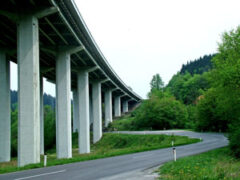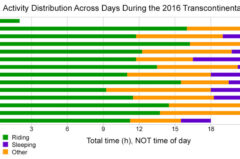Ultra-distance cyclists need to maintain a positive mental approach and deal with intense emotions. Physical exhaustion and mental fatigue can make this difficult, but being prepared and aware can help you to get through the difficult times.

Page Contents:
Ride Reports
One of the best methods of mental preparation is to read reports from participants in ultracycling, bikepacking, and endurance sports in general because they tend to include a lot of descriptions of how individuals handled problems, decisions they made that they regretted and learned from, mental and emotional turmoil that they went through during the race, descriptions of how they managed their sleeping, eating, and riding schedule, and many other snippets of advice or things that will make you think about how you would handle certain situations. Links to race reports are included in the summaries of each edition of the The Transcontinental Race.
Mood
Maintaining a positive attitude is very important when putting in long, hard days on the bike day after day in a bikepacking race. Staying positive is far easier for some people than others, but nobody feels great throughout an entire race. There will be times when you lack energy, you have more physical pains than usual, and you are struggling to stay motivated. Such periods could last for maybe just a few hours or perhaps a full day or more. Your mental approach during these periods is extremely important to ensure that you don’t lose significant time or possibly even retire from the race unnecessarily.
Your mood is often related to your energy level, which is normally determined by how much you’ve been eating recently. Therefore, being in a negative mood and lacking motivation is often a major sign that you need to eat more. Sleepiness can also result in a severe lack of physical and mental energy, and it is always surprising how much extra energy you can have after even a brief sleep (just 20-30 minutes works for many people), and your mood might be completely different afterwards.
The most important tool when things become mentally difficult is having experienced such situations in the past. If you’ve been through bad patches on long rides before and came out on the other side to re-find your energy and positivity then recalling that experience will help you to maintain hope the next time you’re struggling, and hopefully to know what helps you to come out of it. Without that experience, it is easy to assume that things are only going to continue to get worse and never better. This is one of the reasons why doing Multi-Day Training Rides is so important.
Cold or wet weather can easily cause your mood to become more negative and thereby cause you to ride slower or take more time off of the bike. This is the main reason why I bring Clothing for all weather and equip my bike with full Fenders/Mudguards. For me, the extra weight is more than worth it, even if I end up not using some of my gear, knowing that I have it gives me the confidence that I can take on whatever conditions that I find and so I have nothing to fear.
Motivation
Why do people do bikepacking races in the first place? Camille McMillan, who has photographed many of the Transcontinental Races, put it most eloquently when discussing his photo exhibition of images from the race, entitled Un-Lost, with the Apidura blog:
“It’s about doing this incredible journey; about finding yourself, and your limits. … The Transcontinental is a bit like a modern pilgrimage. How many riders are actually doing it to race for the win? Not many. Most are just looking to compete in something, push themselves, set themselves a goal, lose themselves – find themselves. A lot of people probably don’t know why they’re doing it, but find themselves doing it anyway. To some degree they’re all trying to get un-lost.”
Even people who are strongly motivated to finish the race at the beginning can have that motivation battered by unfortunate events, mental fatigue and turmoil that lasts for days on end. It is then when we discover if we really have the mental aptitude to complete such a mammoth task.
Strong headwinds can be the most demoralizing kind of weather. Headwinds can cause you to work much harder than usual while riding at a speed that is significantly slower than you want. This can quickly put you behind schedule and challenge your determination to keep riding. In these situations, it is important to adjust your expectations. Everyone else around you is probably experiencing similar weather and struggling just as much as you, so even if you are falling behind your intended schedule, you are probably not losing ground to other riders. So keep plugging away and the winds will eventually die down. The Schedule & Goals page includes more advice about strategies that can be used in bad weather.
Some people struggle to stay positive and focused on long climbs. Some major climbs can take 2 to 3 hours to climb at typical ultra-cycling speeds, which is something that a lot of people have never experienced before. As with headwinds, you need to keep in mind that everyone else is probably finding it equally hard and taking a similar amount of time. You also need to know how to pace yourself on such long climbs, taking it easy at first instead of powering up them like you might on the shorter climbs that you are used to when riding closer to home. As discussed on the Schedule & Goals page, you should adjust your distance goals for days that involve a lot of climbing so that you don’t get demoralized by how many fewer kms you are able to ride. On those days, you may want to use a goal of the number of hours spent on the bike rather than worrying too much about the distance covered.
It can be useful to bring elevation profiles for each section of your route, either on paper or as images saved on a smart phone. I’ve read many reports from people who were surprised and often demoralized by finding a decent-sized climb on their route that they weren’t expecting because they hadn’t looked at their route in enough detail and didn’t have an elevation profile to check.

I enjoy mountainous sections of the route and I’m reasonably adept at handling most weather conditions, but I struggle to maintain my motivation and energy on long, monotonous roads with minimal scenery. Some people find listening to music helps in these situations; I’ve never been a fan of doing that, but read this reflective post on the topic from someone who rode the 2017 TCR and found that listening to music helped them. I try to concentrate on my ride data and metrics and start setting small riding goals to keep me focused. Because I know that I’ll struggle on such sections, I factor this into my Route Planning and opt for the smaller, more interesting backroads whenever they add only minimal distance and climbing. I may make multiple route plans for some sections, one with the more interesting option and one with the faster option, and then decide when I am there which I am in the mood to do at the time.
A change of environment can often cause motivation and energy to return quickly. I find that entering a large city with a lot of traffic stimulates and energizes me quickly regardless of how I was feeling 15 minutes earlier. Also, a major climb or descent will often change my mood and re-engage my attention. Obviously you can’t suddenly add such features at any time, but knowing that your attitude will change when you reach such features can often be enough to improve your outlook before you even get there.
Extreme Emotions
Despite expecting a big emotional release at the finish line of an ultra-distance bike race, not many people experience it. The more typical reaction is something more muted involving relief and satisfaction rather than extreme elation. The elation more often gets released at random moments during the final days of the race when people are finally realizing that they will achieve their goals.
Having spent months or years preparing to do the race and having made it a very important part of their lives and who they are, it is not surprising that many people report getting emotional and often crying due to joy, sadness, or both while riding. The importance that they placed on achieving their goal, the mental and physical turmoil that they are going through, and sometimes the isolation of being alone riding across various foreign lands can release itself in intense emotional outbursts. Don’t be surprised if you experience such reactions even if you are someone who remains completely calm in the rest of your life.
Having to scratch from the race tends to be the most difficult thing to deal with emotionally, which I had to do during the Transcontinental Race in 2015. Analyzing every decision made and trying to determine how you could have avoided the problems or wondering if you could have continued despite them is part of the process of getting over the disappointment. All is not lost – many people who scratch from a race return the next year having learned a lot in the process.
Loneliness & Camaraderie
Being essentially alone with only your own thoughts for company for the length of a bikepacking race is also a mental and emotional test that some people respond to quite well and others really struggle with. If you think that it will be a significant problem for you then you should consider riding the race as part of a pair rather than solo if that is an option.
Riding in a pair brings about a whole new set of potential problems, but it has worked out very well for some people. Pairs tend to have a lower rate of finishing than solo riders, but that is mainly because both members of the pair need to avoid any potential problems that could cause either of them to scratch. If one person in a pair is forced to scratch then the other person can always continue without them, although they will not be categorized as a solo finisher and will not be placed in the pairs standings for obvious reasons.
I have not personally experienced doing the TCR as a pair, but Eric Bystrov has and made an elloquent summary of the positives and negatives of the experience in the TCR Facebook group. Many people also shared their experiences in the comments to that post, all of which are worth reading if you are considering riding as a pair.
Racers in bikepacking races frequently meet each other during the event. Whenever this happens, the bond of camaraderie and respect is very strong, and it’s always great to talk and exchange stories. There are very few other situations in life when you can meet someone that you’ve never talked to before but immediately know that you have so much in common with and feel so comfortable talking to.
Riding with someone else for a couple of hours, eating in a restaurant together, or staying in a hotel with another rider is therefore quite common. Staying together for a more significant length of time is generally discouraged in the spirit of being solo and self-supported. If there is a pairs category then two riders who start the race as solos but then decide to ride together can declare themselves to be a pair and continue riding together and then share equipment and draft each other, just as other pairs are allowed to. Repeatedly meeting the same rider multiple times over several days simply because you’re both riding the same route at a similar speed is obviously not against the rules for solo riders and does happen quite often.
The social interaction that is available through a phone can be extremely important for your emotional state, especially when you don’t see any other racers for a couple of days. Try not to lose time on social media, but checking it occasionally and making a short post can help you to feel more connected to the world.
Anxiety
A lot of uncertainty and doubt is experienced during bikepacking races, which can cause negative emotions such as anxiety and stress. The biggest sources of uncertainty tend to be where you will sleep each night and whether you will find food in the next town.
Some uncertainty can be avoided by researching towns along your route before the race to know what services are available (see the Route Planning page and Schedule & Goals page). You shouldn’t book hotel rooms more than 24 hours in advance, but you may use your phone during the day to book a room for that night. This may help by removing uncertainty and so reducing anxiety but it may end up taking longer than you want to get to the hotel or you may have kept riding longer if you hadn’t already booked a room. A trade-off must therefore be made between optimizing your race strategy and minimizing anxiety.
Life on the Road
People’s way of life changes drastically during a bikepacking race into a lifestyle that most people are not familiar with. This cannot be properly experienced during a 2-3 day training ride because that is too short to properly forget normal life or to fully embrace the transformation into a vagabond racer. This adaptation can be interesting mentally and emotionally.
During the first few days of a race, there is excitement, novelty, freshness, and in an event like the Transcontinental Race across Europe, most people are starting in countries and cultures that they are at least somewhat familiar with. As the landscape and culture changes and regular life becomes a more distant memory, a new and somewhat bizarre lifestyle and outlook takes over.
The physical aspect involves spending long days in the saddle and sometimes sleeping in uncomfortable places and eating quite a random diet. However, it is the mental and emotional adjustment that is the most challenging, fascinating, and almost impossible to understand until you’ve been there. It is this aspect that makes racers feel an instant bond with each other when they meet because we know that we’ve been having similar experiences physically and emotionally; we’ve been living in an odd way that very few people in the world will ever know or even be able to relate to. It is a simple, wild, brutal, but in some ways beautiful way of living that makes these races so special, fascinating, and, for some people, addictive despite all of the hardship involved.
In the Transcontinental Race, riders typically average going through one country per day for up to two weeks, which means that they see and interact with various different cultures that they don’t fully understand. The language keeps changing and it’s often difficult to find anyone who understands you. It’s possible to not see another racer for multiple days. Cleanliness of clothing and body starts to slacken and the feeling of being a complete outsider who everyone is looking at strangely becomes stronger and harder to ignore until it just becomes the new norm.
Adapting to such changes would be challenging at the best of times, but being physically exhausted and mentally tired makes everything even harder to handle. Trying to stay focused on the race and continuing to make progress can be extremely difficult when finding somewhere that has a few home comforts like a hotel or restaurant, or anywhere with an internet connection to allow some contact with home. The finish line is always pulling strongly, but one of the reasons why finishing feels so odd is that all too suddenly the new lifestyle that was becoming enjoyably familiar is completely over and everything has to change once more, which elicits yet more mixed and confused emotions.
Post-Race Blues
The emotions experienced after the race finishes are equally varied and difficult to convey in words. Marion warned people about this in this post in the TCR Facebook group, and I plan to add more about this here in the future. There is also an interesting article on this topic at CyclingTips by Christie Hamilton.
The emotions that are experienced during and after these kinds of races are extremely hard to explain and convey. I’ve done my best to give some insights, but it’s difficult to imagine until you’ve been down that road.
Last significant page update: November, 2018
This page is in the Mental Approach & Strategy section. The next page in this section is:

